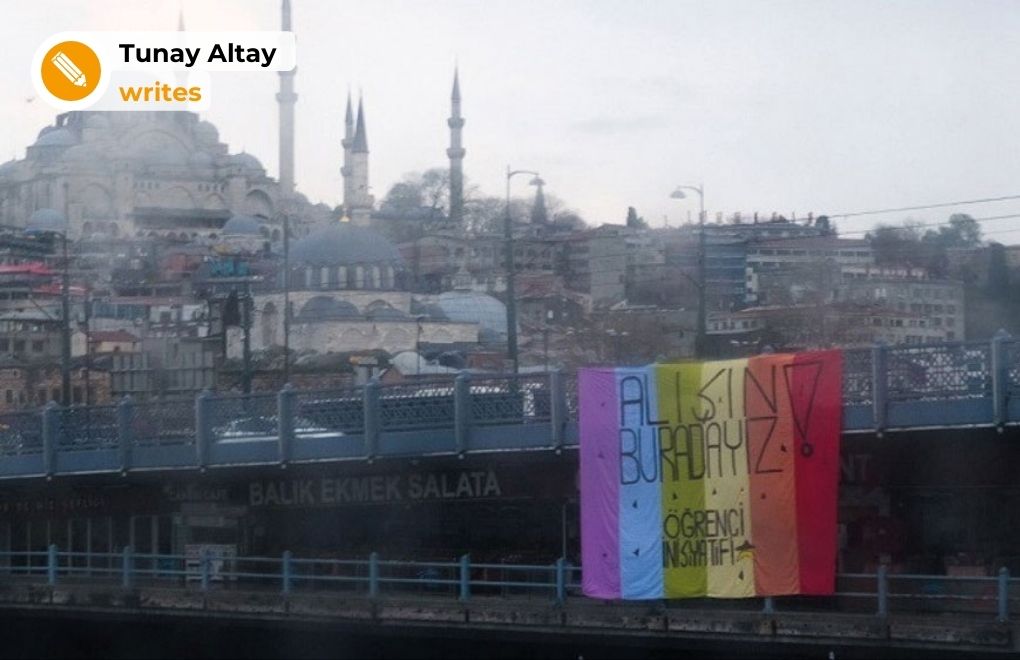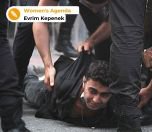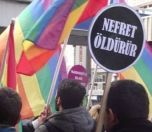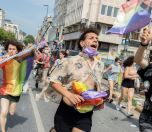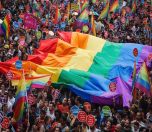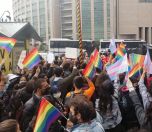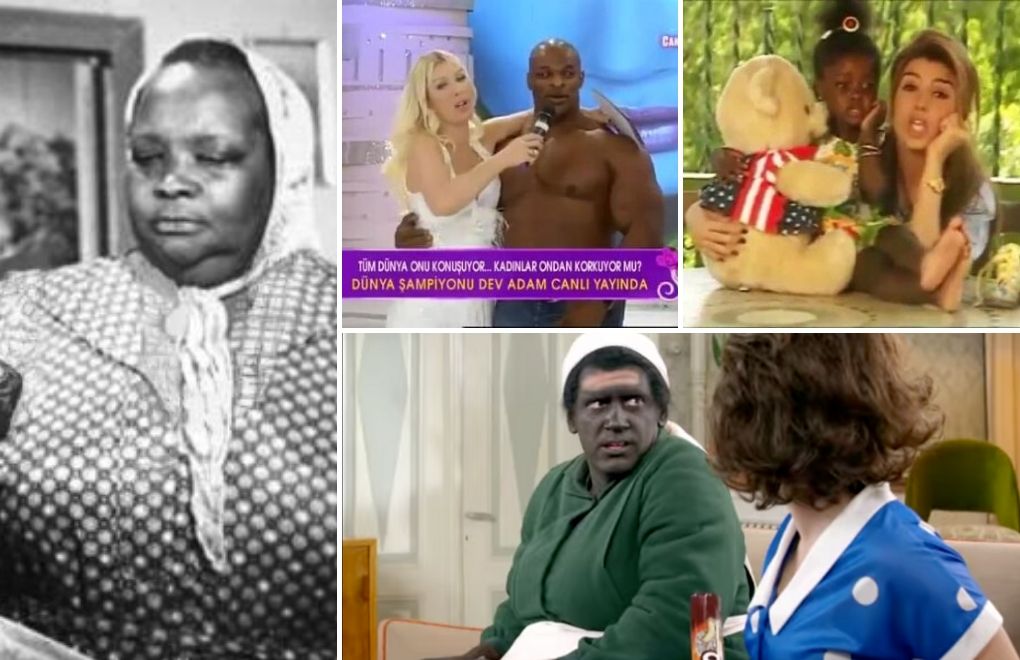* Credit: 'Öğrenci İnisiyatifi's [Student Initiative] public intervention in İstanbul on March 30, 2021 (English: "Get used to it; we are here")
This article is originally published on the website of LSE Engenderings. We share the full article for bianet English readers:
On April 14, 2021, a group of students from Turkey's Middle East Technical University (METU) gathered at a staircase on campus in Ankara. This staircase was no different from any other staircase on the 11,100-acre campus, yet this was the third time in a fortnight that the students had met at the same point, carrying buckets of paint to color the stairs in rainbow hues. Their previous attempts to paint the stairs had been vandalized by the school administration, the colors the students aspired to see on their campus had been covered in gray and painted with the colors of the flag of Turkey. After applying what was now the third layer of paint, the students left the staircase, feeling accomplished. Little did they know that the next day, the staircase would be vandalized again. [1]
From one staircase to another
The story of METU's rainbow staircase is emblematic, especially in the light of broadening and unrelenting university protests against the government's authoritarian policies and its repression of basic human rights and freedoms. LGBTQ activists' fight for social justice since the 1990s has granted the rainbow flag identification in Turkey with a variety of local meanings, both representing resistance against and repression from the government.
Recently, however, the public controversy over the rainbow in Turkey grew to such heights that on March 25, 2021, 12 students in İstanbul were taken into custody for unfurling rainbow flags in public. [2] The students in question were part of the Boğaziçi University protests, which had brought thousands to university campuses to oppose the politicized appointment of a pro-government university rector. [3]
The Boğaziçi University protests quickly elevated to the center of political debate when an artwork from the Boğaziçi campus depicting the Kaaba and LGBTQ flags circulated widely and was used by the media and government officials as evidence that the protests were nothing but an "ugly attack" that "mocked Turkey's religious beliefs". [4]
During a speech in February 2021, President and ruling Justice and Development Party (AKP) Chair Recep Tayyip Erdoğan addressed the public about the Boğaziçi protests and instead of talking about his controversial appointment, Erdoğan decided to set the record straight, both literally and figuratively: "There is no such thing as LGBT". He continued: "We don't accept these young people as the youth of our country who truly embody national and spiritual values." The stigmatization of the LGBTQ people and their basic right to protest went so deep that Erdoğan addressed the protestors by comparing them to terrorists: "Are you students, or are you terrorists who raid the rector's offices and attempt to occupy it?" [5]
Who is afraid of the rainbow? Turkey's Islamist and ultra-nationalist coalition
Against the intensifying attacks, LGBTQ activists and allies united under a social media campaign: #GökkuşağımaDokunma (in English: #DoNotTouchMyRainbow) to condemn the government's acts and the criminalization of LGBTQ people and their symbols in Turkey. Scrolling through the #GökkuşağımaDokunma thread, I see posts of people gripping their flags with the caption: "Who is afraid of the rainbow?"
The question appears almost rhetorical as the clear answer for many is President Erdoğan and his AKP. In recent years, however, the AKP had to join forces with the Nationalist Movement Party (MHP) to form the 2018 coalition government: the People's Alliance (AKP/MHP coalition). This coalition, on top of the schisms within the AKP, forces us to revise our assumptions about Erdoğan's singular hold on power in Turkey.
Once bitter rivals, the coalition between the Islamist AKP and the ultra-nationalist MHP signals a shift, if not an expansion, within the parameters of Turkey's politics, and represents an even more alarming environment for minorities and marginalized communities in Turkey for several reasons.
MHP Chair Devlet Bahçeli, who is in the coalition government, adheres to an ultra-nationalist ideology shaped by Euroscepticism and the ideology of Turkish-Islamic synthesis. He has been a fierce opponent of the pro-minority, pro-Kurdish Peoples' Democratic Party (HDP) and an advocate of invasive and interventionist military actions in southeastern Turkey and neighbouring countries.
Within this political alignment of ultra-nationalism and religion, the scapegoating of LGBTQ people is also not a new phenomenon for the MHP. We can see this with the open threats against the Istanbul Pride March in 2016 and 2017 made by Alperen Ocakları, an ultra-nationalist organization connected to the MHP. Taken as a whole, some of these views are not foreign to the AKP, of course, but they are certainly sharpened and heightened with the MHP's increasing role in the government and its wide-spread network of ultranationalist organizations.
Beyond the fear: Political homophobia as a tool for social polarization
Since the first public case of COVID-19 in Turkey, the AKP/MHP coalition has suffered major blows due to their mismanagement of the crisis, a series of political scandals, and Turkey's growing economic turmoil. Their waning popularity among voters has had direct consequences: the growth of grassroots and political opposition.
Under these circumstances, the AKP/MHP coalition has shown an increase in their profound political polarization by picking battles against Turkey's underrepresented and misunderstood identity groups. Similar to other far-right leaders, like Jair Bolsonaro in Brazil and Vladimir Putin in Russia, they have also invested heavily in political homophobia by using anti-LGBTQ discourses and practices for political gain and nation-building purposes (see Weiss & Bosia, 2013). Political homophobia stems from fear and prejudice, but ultimately aims to manipulate the public against LGBTQ people, their representation, and their allies.
Through the calculated use of political homophobia, President Erdoğan and Bahçeli call upon a deeply rooted logic of stigmatization of the "other" (Çaǧaptay, 2017; Engin & Pals, 2018; Smith, 2019) in Turkey's politics, which has targeted numerous groups and ideologies: communists, the 'West', Kurds, religious minorities, Kemalists, secularists, looters, and, recently, feminists and LGBTQ people.
Understanding political homophobia as a calculated political manoeuvre, it is probable that the coalition aims to rekindle their popularity among voters by binding ideas about (hetero)sexuality with easily exploitable symbols about religion, morality, and nationalism. This way, the coalition aims to target, politicize, and claim victory over a marginalized group. [6]
However, political homophobia serves another strategic purpose for the AKP/MHP coalition: fracturing the opposition. In this divisive strategy, if the opposition parties defend LGBTQ rights, the AKP/MHP coalition marks them as "degenerates", even as conspirators with "foreign powers" who are trying to undermine Turkey's (hetero)morality and "growth". In this discourse, the AKP/MHP coalition relies on the support of socially conservative voters which, they hope, will draw a red line against their twisted representation of LGBTQ as a "Western degeneracy".
On the other hand, if the opposition parties do not defend LGBTQ rights, they become failed human rights defenders and risk losing the support of Turkey's liberals and pro-democracy voters, who are vital if the opposition is to obtain power. We can see this in Bahçeli's remarks following a supportive comment on LGBTQ people made by Kemal Kılıçdaroğlu, the Chair of main opposition Republican People's Party (CHP): "You cannot talk about nationalism or moral values, nor even walk on the streets and call yourself a man. Our only advice to you is to cover yourself in rainbow and continue your protest".
Waving our flags
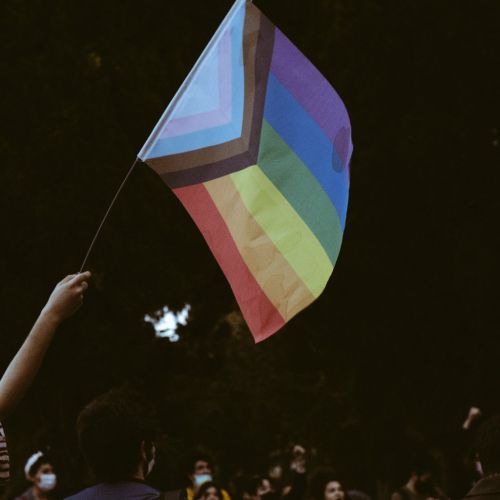
* Credit: Boğaziçi Resistance Twitter account
Covering ourselves in the rainbow and continuing our protest might be a way to imagine our next steps, but Bahçeli's intention was definitely not to encourage us to show our colors. On the contrary, his comment aimed at the opposition by pushing Kılıçdaroğlu away from the center of politics, which is shaped by the Islamist and ultra-nationalist views of AKP/MHP coalition.
President Erdoğan and Bahçeli treat the rainbow as an easy target, clear evidence of supposed "degeneracy" and the ultimate excuse for political and social polarization. In this sense, the rainbow and LGBTQ people become convenient rhetorical fodder against which the AKP/MHP coalition seeks to define their role as the protectors of socially conservative values and the "national will" (milli irade). Merged with the ultra-nationalist politics of the MHP, political homophobia under the AKP/MHP coalition is sharpened by racism, militarism and the locally organized web of violent youth organizations supporting Bahçeli's ultra-nationalist politics.
Amid the state ideology which treats the rainbow as a "weapon" or as a boundary object defining the limits of acceptability in Turkey's politics, the layers of paint covering the streets, passageways, and staircases in Turkey hint at a larger history that is, sometimes, submerged under the gray paint.
Similar to the story of the METU staircase, during the Gezi Park uprising in 2013, the residents of Cihangir – a popular neighborhood near Gezi Park – woke up one day to a public art intervention: a public staircase painted in rainbow hues. [7] In a precursor to what would later become an established state response to the rainbow, the police painted over the stairs. Yet days later, the local community struck back and re-painted the stairs, chanting the slogans "Colorful life against fascism" and "Everywhere is rainbow, everywhere is resistance".
The rainbow might be carried to the center of politics with the AKP/MHP coalition's hope to fracture the opposition, yet the colors that keep appearing, despite their attempts, can be considered a sign of people's persistence and will to retain possession over their narratives, which are misrepresented and stigmatized by the AKP/MHP coalition.
[1] During this time, this back-and-forth between the students and the administration had even inspired a Twitter account dedicated to sharing the latest news from the staircase to over 1,200 followers patiently waiting to see what would happen next.
[2] In the days following the detention of the students on March 25, more gathered with rainbow flags to protest and were faced with more police brutality, with the number of people detained over the flags rising to 42.
[3] The protest was sparked as early as January 2021. The appointment overstepped institutional customs and was seen as part of the AKP's attempt to undermine academic freedoms and to further its control over the opposition, in this case, students and academics.
[4] The Kaaba remains one of the holiest sites in Islam, yet artistic interpretations of the site in Turkey are not uncommon (see the infamous Kaaba cake).
[5] This comment recalls previous cases involving rainbows on Turkey's campuses. When students from the Middle East Technical University (METU) used rainbow flags in 2018, the university administration opened an official investigation, explicitly suggesting that the rainbow flag was criminal, and shouldn't be used in protests.
[6] A recent case from the US illustrates political homophobia in practice. By issuing an alarming number of anti-trans laws, the Republican Party (GOP), it is argued, is taking the following strategy: targeting a marginalized group, convincing voters that they pose an existential threat to society, and claiming victory by crushing and penalizing the group's rights and existence.
[7] LGBTQ organizations and activists played a crucial role during the Gezi uprising (Savcı, 2021; Yoruk, 2014; Zengin, 2013) and, as they waved the rainbow flag alongside other opposition groups, the rainbow gained a new level of recognition nationally.
About Tunay AltayTunay Altay is a Ph.D. candidate in sociology at Humboldt University. His research and teaching focus on the issues of citizenship, migration, sexuality, and race. In his spare time, Tunay writes cultural commentaries about politics, art, and activism in Germany and Turkey. He is also involved in community-organizing for LGBTQ groups in Berlin. |
(TA/SD)





